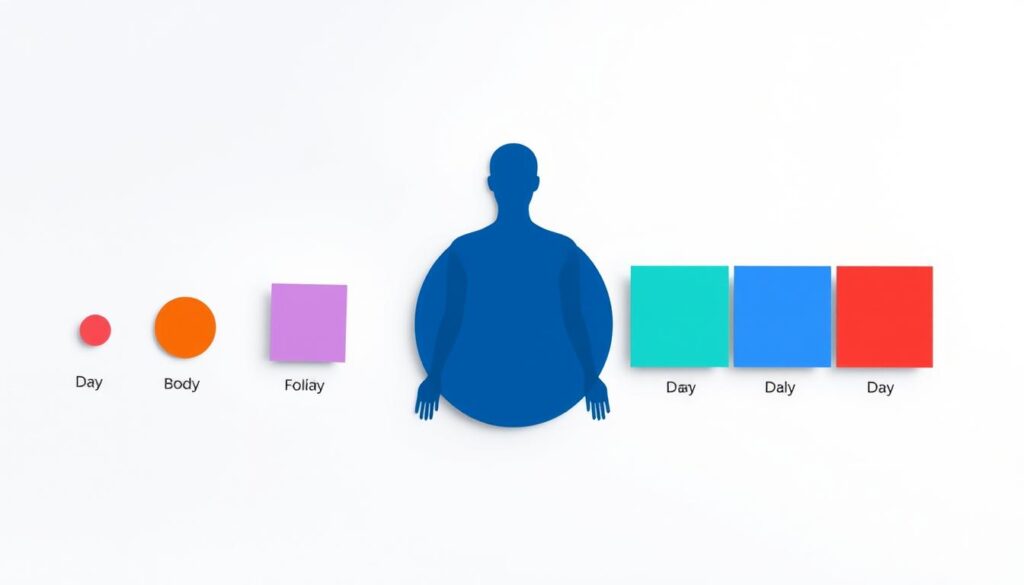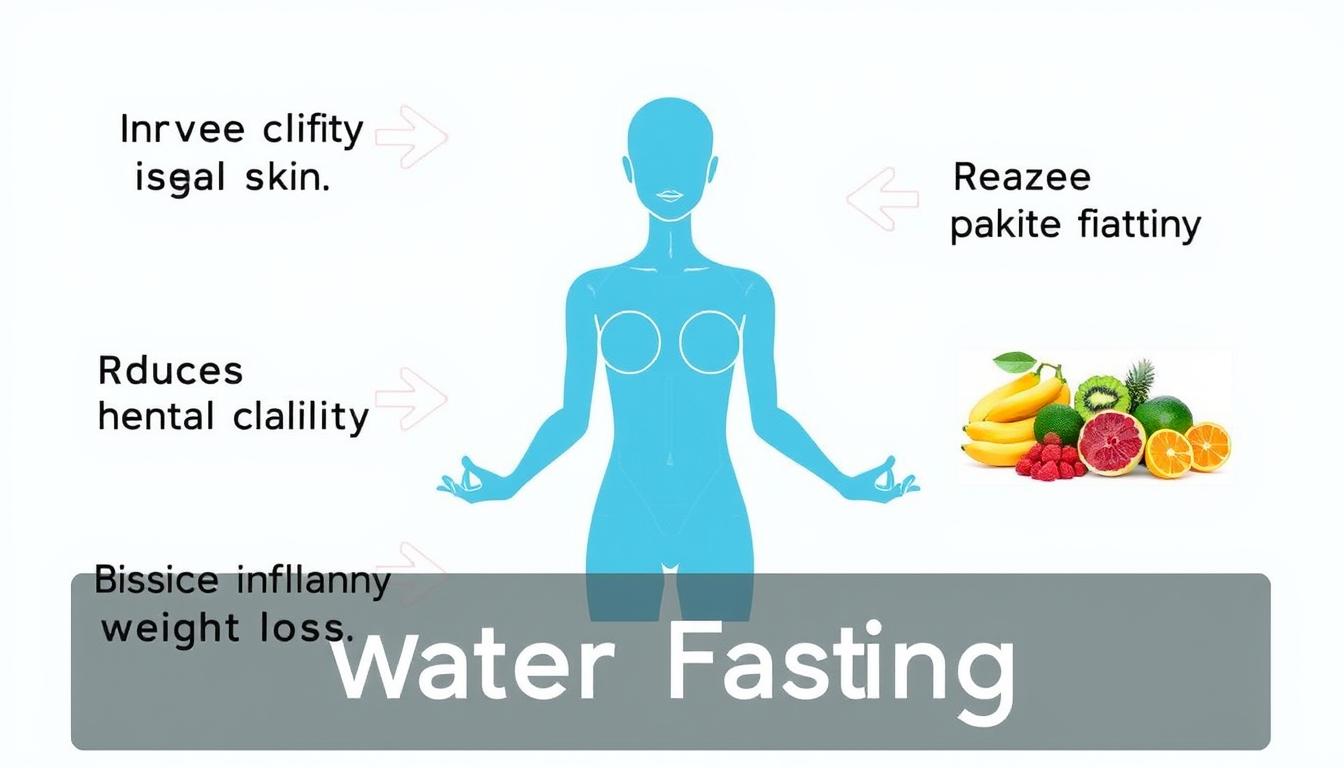Water fasting has become more popular in recent years for its health benefits. It means drinking only water for a period, usually 24 to 72 hours. People do this for weight loss, detox, and to help their cells repair.
Water fasting changes the body in ways that can make you healthier. Studies show it might lower the risk of diseases like diabetes, cancer, and heart disease. It also helps with autophagy, which is breaking down and recycling old cell parts. This can prevent diseases such as Alzheimer’s and cancer.
When you fast, your body changes how it uses energy, handles hormones, and digests food. It starts to use stored fat for energy, which can lead to weight loss and ketosis. It also makes insulin and leptin work better in your body.
But, water fasting is not for everyone and should be done carefully. It can cause dehydration and other problems if not done right. Make sure to drink enough water while fasting and slowly start eating again to avoid issues.
Key Takeaways
- Water fasting involves consuming only water for a set period, usually 24 to 72 hours.
- Potential benefits of water fasting include weight loss, reduced risk of chronic diseases, and promotion of cellular repair processes like autophagy.
- During a water fast, the body experiences changes in metabolism, hormone levels, and digestive function.
- Approach water fasting with caution and under the guidance of a healthcare professional to minimize risks.
- Ensure adequate hydration during the fast and gradually reintroduce food afterward.
Understanding Water Fasting: Definition and Duration
Water fasting means not eating or drinking anything except water for a certain time. This method has been around for centuries for health, spiritual, and religious reasons. Now, it’s getting popular for its possible health benefits like losing weight and improving heart health. But, it’s important to know the risks and how long to do it before trying it.

What is Water Fasting?
Water fasting is a type of fasting where you don’t eat or drink anything with calories, except water. The goal is to let your body rest and detox. A study in 2019 found it safe and beneficial for health during fasts of 4 to 21 days with a doctor’s watch.
Typical Duration of Water Fasts
Water fasts can last from a day to several weeks, depending on your health and goals. Starting with a short fast of 24 to 72 hours is a good idea. Longer fasts should be done with a doctor’s advice.
Beginners should start with a 24-hour fast and slowly increase the time. This helps your body adjust and reduces side effects. A 2018 study looked at the benefits of fasting every other day for healthy adults.
“Water fasting is a powerful tool for promoting health and well-being, but it is crucial to approach it with caution and under the guidance of a qualified healthcare professional.” – Dr. Alan Goldhamer, founder of TrueNorth Health Center
Make sure to drink enough water during a fast, about 2-3 liters a day. This helps with detox and staying hydrated.
| Fasting Duration | Potential Benefits | Risks and Precautions |
|---|---|---|
| 24-48 hours | Improved insulin sensitivity, weight loss, increased autophagy | Dehydration, electrolyte imbalances, hypoglycemia |
| 3–5 days | Enhanced detoxification, reduced inflammation, improved cardiovascular health | Mineral deficiencies, orthostatic hypotension, refeeding syndrome |
| 7+ days | Profound therapeutic effects, reset of immune system, potential treatment for chronic diseases | Severe nutrient deficiencies, cardiac complications, gallstone formation, requires medical supervision |
Preparing for a Water Fast: Steps and Precautions
Before starting a water fast, it’s key to prepare well. This ensures a safe and effective experience. Getting your body and mind ready can reduce risks and boost the benefits of fasting.
Consulting with a Healthcare Professional
It’s vital to talk to a healthcare professional before a water fast, especially if you have health issues or take medicines. Some people, like those with gout, diabetes, or eating disorders, should not fast without a doctor’s okay. This includes older adults, pregnant women, and kids too. A doctor can check if fasting is safe for you and help you prepare and fast correctly.
Gradually Reducing Food Intake Before the Fast
To get your body ready, slowly cut down on food 3–4 days before the fast. You can eat smaller meals or fast for part of the day. This makes the fast easier and less uncomfortable. Also, eating whole, nutritious foods before helps keep your body strong.

Ensuring Adequate Hydration During the Fast
Drinking enough water is key during a fast. Experts say to drink 2–3 liters of mineralized water a day. Some studies recommend at least 40 ounces of distilled water daily. Listen to your body and drink when you’re thirsty to avoid dehydration. Dehydration can cause dizziness, headaches, and low blood pressure. Staying hydrated supports your body and keeps you feeling good during the fast.
| Preparation Step | Importance |
|---|---|
| Consult with a healthcare professional | Ensures safety and provides guidance for individuals with pre-existing conditions |
| Gradually reduce food intake before the fast | Minimizes side effects and discomfort during the fasting period |
| Ensure adequate hydration during the fast | Supports body functions and prevents dehydration symptoms |
By taking these steps, you can safely and successfully fast with water. Always be careful and follow a doctor’s advice to avoid risks and get the most from fasting.
Potential Benefits of Water Fasting
Water fasting has become more popular for its health perks. It can help with cell recycling, increase life span, and prevent diseases. While we need more studies, many health benefits have been found.
Promoting Autophagy and Cellular Repair
Water fasting boosts autophagy, a process where the body recycles old cells. This helps fight diseases like cancer and Alzheimer’s. Studies show the best time for this effect is between days 3–5 of fasting.
Reducing Blood Pressure and Improving Cardiovascular Health
Water fasting can also help the heart by lowering blood pressure and cholesterol. A study with 68 people with high blood pressure showed big improvements. It suggests water fasting could lower heart disease risk, but more research is needed.
Enhancing Insulin and Leptin Sensitivity
Water fasting may make the body more sensitive to insulin and leptin. These hormones control metabolism and hunger. A study found that fasting for three days reduced insulin levels by 30%, which could help manage diabetes.
Lowering the Risk of Chronic Diseases
Water fasting might lower the risk of diseases like diabetes, cancer, and heart disease. A study showed it lowered triglycerides, a heart disease risk factor. It also protects the heart from free radicals, which can cause chronic diseases. Water fasting could be a way to fight chronic diseases with its anti-inflammatory effects and cell health support.
| Benefit | Description |
|---|---|
| Autophagy | Peaks between days 3-5 of water fasting, promoting cellular repair and regeneration |
| Blood Pressure | Decreases during water fasting, contributing to improved heart health |
| Insulin Sensitivity | Increases during water fasting, helping regulate blood sugar levels and potentially reversing diabetes |
| Longevity | Autophagy and cellular cleansing during water fasting may slow down the aging process, promoting longevity |
Water Fasting: What Happens to Your Body When You Only Drink Water
Water fasting means not eating and only drinking water for a while. Your body changes a lot when you do this. Let’s see how it affects your metabolism, weight, hormones, hunger, digestion, and detox.
Changes in Metabolism and Weight Loss
When you fast with water, your body starts to burn fat for energy instead of carbs. This can lead to losing weight. A 2022 study found that fasting for 10 days helped people with weight issues lose weight and reduce BMI. But, some of the weight loss might be from losing water and a bit of muscle too.
Effects on Hormone Levels and Hunger
Water fasting changes your body’s hormones, like those that control hunger. The “hunger hormone” might go up, making you feel hungry. Yet, fasting could also lower leptin levels, which helps control how much you eat. Plus, it might raise growth hormone levels, helping you keep muscle and burn fat.
| Hormone | Effect During Water Fasting |
|---|---|
| Ghrelin | May increase, leading to feelings of hunger |
| Leptin | May decrease, helping regulate appetite and prevent overeating |
| Growth Hormone | Increases, helping preserve lean muscle mass and promote fat burning |
| Cortisol | May increase, leading to temporary feelings of stress or anxiety |
Impact on Digestive System and Detoxification
Drinking only water lets your digestive system rest and heal. It uses less energy for digestion and more for fixing and cleaning the body. This can make your digestive system work better by healing the gut lining.
The liver, key in detox, might get a break during fasting. Some think fasting can clear toxins, but we need more studies.
Be careful with water fasting and talk to a doctor first. It might help with blood pressure and stress, but we don’t know much about its long-term effects. Eating small, nutritious meals after fasting is key to keeping off the weight you lost.
Risks and Precautions Associated with Water Fasting
Water fasting may have benefits, but it’s important to know the risks and precautions. A big concern is electrolyte imbalances, like hyponatremia, which happens when sodium levels drop too low. This can cause seizures, brain swelling, and even death if not treated quickly. Water fasting can also lead to low levels of potassium, calcium, and magnesium, affecting nerve, muscle, and heart function.
Dehydration is another risk of water fasting, especially if you drink too much water. This can overload the kidneys and swell cells. Short-term water fasting can cause headaches, nausea, weakness, and fatigue. These symptoms can be dangerous if ignored. Studies show water fasting can lead to high blood pressure, arthritis, colitis, and other health issues.
People with certain medical conditions, like diabetes or heart problems, should not try water fasting. It’s also not safe for pregnant or breastfeeding women. The science on water fasting’s benefits is weak, and safety concerns led to excluding people with health issues from studies. While it may seem to protect against cancer and other diseases, it’s best to be cautious. Intermittent fasting might be a safer choice, eating normally for eight hours a day.
Before starting water fasting, talk to a healthcare professional. They can help you find safer ways to improve your health, like eating a balanced diet and getting electrolytes from fruits and veggies. For more info on water fasting’s risks and benefits, visit https://www.waterdiet.com/4-day-water-fasting-weight-loss/.




